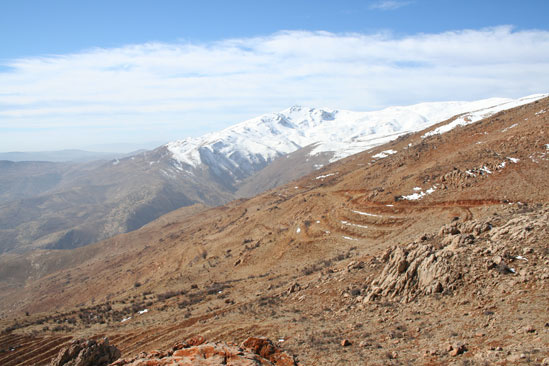Tel Aviv Concerned about Assad’s Success

These days, there is talk of the issue of the Golan Heights and a missile called the Resistance missile. Considering the speech made by Bashar Assad in support of Hezbollah where he said that the two fronts must be united against Israel, how strong would you consider the possibility of a new war front being opened in Golan?
It seems that with regard to Syria all possibilities must be considered:
1. There is a theoretical reason: Since numerous variables are involved in the Syrian scene and there are minute-by-minute developments, therefore, anything can happen. Following Israel’s attack against Syria and the targeting of military centers in the surrounding areas of Damascus, it seems that the equations have changed to a great extent, because for the first time in the developments of the past 26 months in Syria, Israel has entered the scene and directly intervened. Therefore, it does not seem impossible that even some other movements in Syria that have a view similar to that of Bashar Assad would become active.
2. There is also an operational reason: Bashar Assad has stated that following Israel’s attack, he will open the Golan front, which was closed until that time. But he did not mention whether this would happen with the help of the Palestinian groups and Hezbollah. Based on the observations of the analysts, what Bashar Assad meant was the resistance movement. This is an important card and can impact the balance that has been disrupted after Israel’s attack and return it to its previous state. But whether this would become operational or not depends on the conditions of the region.
On the other hand, the Israeli media outlets are beating the drums of war and have even declared that, sooner or later, there will be a war with Hezbollah. How strong, in your opinion, is the possibility of a war being launched by Israel? Considering today’s conditions in Syria, does the Zionist regime want a weak Bashar Assad or will it accept the presence of al-Qaeda?
There is a hypothesis that the war of attrition will practically be continued by the Americans and the western front, so that the forces of both sides, meaning the supporters and the opposition of the Syrian government, gradually become weakened by the prolongation of war. The US and the Zionist regime will benefit the most from this issue because there will no longer be a neighboring country which would stand against Israel. What is related to the issue of Hezbollah is that the Israelis use the language of threats against the issue of resistance and believe that wherever the resistance gains power, they will suppress it. But to what extent they will be able to stop the resistance from gaining power depends on numerous factors. It seems that the grounds are not prepared now for such a trend, for the level of expectations from Hezbollah’s power has grown and if Israel decides to enter the war, the results would be unpredictable. The resistance will certainly take different measures and Israel is also concerned that, like the 33-day war, the grounds would not be prepared for its absolute success. Hence, it seems more likely that Israel takes this position as a preemptive measure to force the resistance to avoid taking harsh stances against the Zionist regime.
Another issue is the military power of Hezbollah and the issue of Hezbollah becoming militarily equipped is a matter of concern which is constantly prevented or stopped by the Zionist regime. On the other hand, Europe also intends to impose sanctions on Hezbollah as a terrorist group. How long can they, in your opinion, struggle against Hezbollah and how patient will they be?
It seems that these issues are aimed mostly at exerting pressure in order to tighten the siege of Syria. Pressure on Syria’s allies and even using the language of threats are more aimed at exerting pressure on Syria. During the past few years, there have not been any serious measures taken by Hezbollah. It rather seems that it was the Israelis that violated some Lebanese positions and even flew over the skies of Beirut and targeted the missile centers of the resistance several times. Therefore, these measures are aimed mostly at exerting pressure on Syria and the resistance front. Of course, there is another point that if the developments of the region move in the direction of Syria’s stability, where Assad’s status would be stabilized, the possibility must not be ignored that another part of the resistance which is Hezbollah might be targeted and weakened by Israel. The issue of capability is another issue. But it seems that under such conditions, when the Israelis feel that the Syrian crisis is developing in Bashar Assad’s favor, they might enter the scene. Then, the positions of the resistance might be targeted.
Considering the region’s stormy conditions, and what we are witnessing in Egypt, Syria and Iraq, is there any possibility of a full-scale war?
If the axis of the full-scale regional war is Syria and the issue of the resistance and its opposing front is proposed, any development in this region which would mean war must be analyzed through the positions of the international powers including the US, Russia and China, because the issues related to Syria have gone beyond domestic developments and have found regional and international dimensions. The issue that one side might unilaterally enter the scene militarily without considering the positions of the other party is practically ruled out, unless there is an agreement among the regional powers to enter a new phase of war wherein anything can happen.

